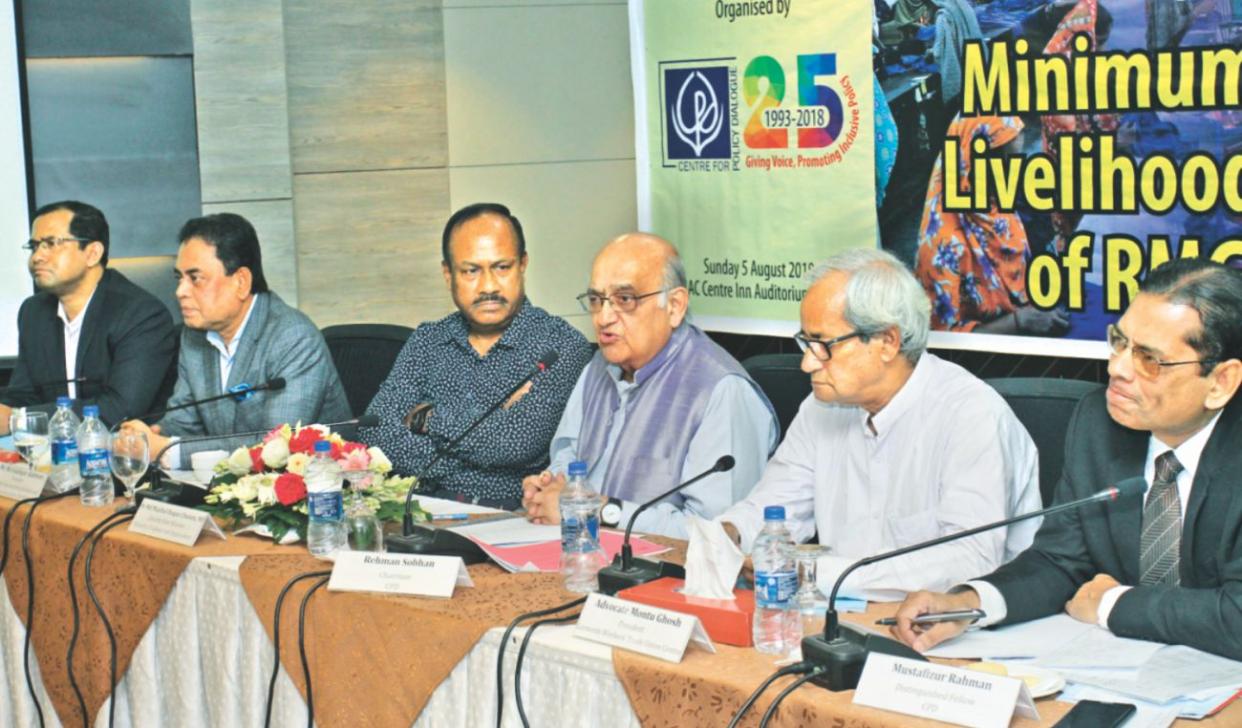RMG MINIMUM WAGE: CPD proposes Tk 10,028

The Centre for Policy Dialogue yesterday proposed a minimum monthly wage of Tk 10,028 for garment workers, in what can be deemed a reasonable middle ground for both the factory owners and workers.
The garment workers are demanding a minimum monthly wage of Tk 12,020 but the factory owners have proposed a 20 percent hike to Tk 6,360.
The private think-tank arrived at the figure by assuming: a family size of 4.4 with 2.1 being earning members, total living expenses, including food and non-food items, of Tk 22,435, and 3 percent savings on basic wages.
The minimum wage for entry level workers would then be Tk 11,004 a month, according to a study of the CPD on the minimum wages and livelihood conditions of garment workers, the findings of which were shared in an event yesterday at the Brac Centre Inn in Dhaka.
However, considering the shrinking of profit margin in garment business as well as possible risks like trade war, rise of petroleum prices, rise in gas price, the CPD suggested a minimum wage of Tk 10,028 or $119 a month.
“Given the current situation, the proposed minimum salary is not adequate for garment workers. But, at the same time, the industry will not sustain if higher salaries are proposed as the production cost is on the rise and the price per unit of apparel items is being squeezed,” said Khondaker Golam Moazzem, research director of the CPD.
Subsequently, he advised involving the buyers in fixing the minimum wage for garment workers.
Also, the government, the factory owners and the foreign retailers should come up with ways to increase the fringe benefits for workers such as cheap housing, quality education for workers' children and recreation, he said.
“Workers are the very central part of the garment industry. This is one industry where the prime input comes from the workers,” said Rehman Sobhan, chairman of the CPD.
Therefore, only giving them a living wage is not adequate; they should be offered a decent lifestyle, he added.
Mustafizur Rahman, distinguished fellow at CPD, said the major buyers should also ensure fairness for workers in the whole value chain of garment business.
The CPD also proposed elimination of the seventh grade and recommended taking into account the sixth grade as the entry level due to a lack of skills in handling the modern machinery and for a standard productivity rate.
So, in case of workers having no children, the wage for grade six would be at Tk 9,228 or $110 a month.
Similarly, the monthly wage for workers who are employed in grade five would be Tk 10,715, for grade four Tk 11,786, for grade three Tk 13,319 and for grade two Tk 15,317.
The CPD also proposed two sub-categories for grade one: grade 1A and grade 1B. “The minimum wage for workers in this grade should be kept open for negotiations,” Moazzem added.
Siddiqur Rahman, president of the Bangladesh Garment Manufacturers and Exporters Association, said the factory owners have proposed the minimum salary of Tk 6,360 considering the inflation rates over the last five years. “The local manufacturers are selling a shirt for $5 to the foreign retailers, who are, in turn, selling the shirt for $20 or above. Who are the main beneficiaries of the $15?” he said.
Mujibul Haque Chunnu, state minister for labour and employment, urged the factory owners to contribute a certain percentage for formation of a central provident fund for garment workers. The government is constructing two more dormitories for female garment workers in Narayanganj and Chittagong so that they can get cheap accommodations, he added.
Montu Ghosh, president of Garment Workers Trade Union Centre, said 8 to 10 female garment workers have to live in a single room and share the kitchen and toilet. “It is not possible to work properly in such a situation,” he said.
The workers should be given medical facilities so that they can go to work in good health.
The government should also rein in the spiralling house rent, he added.
